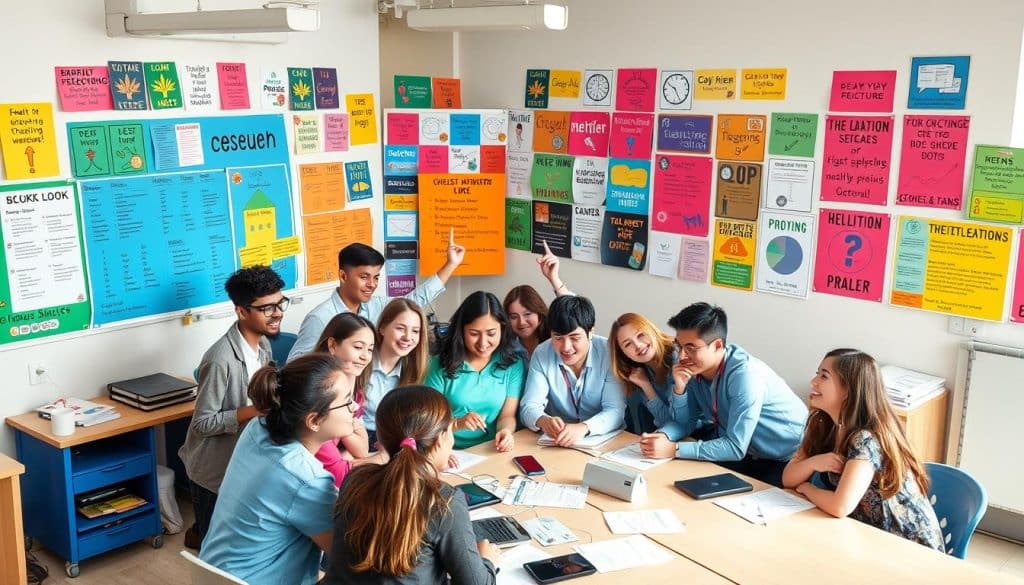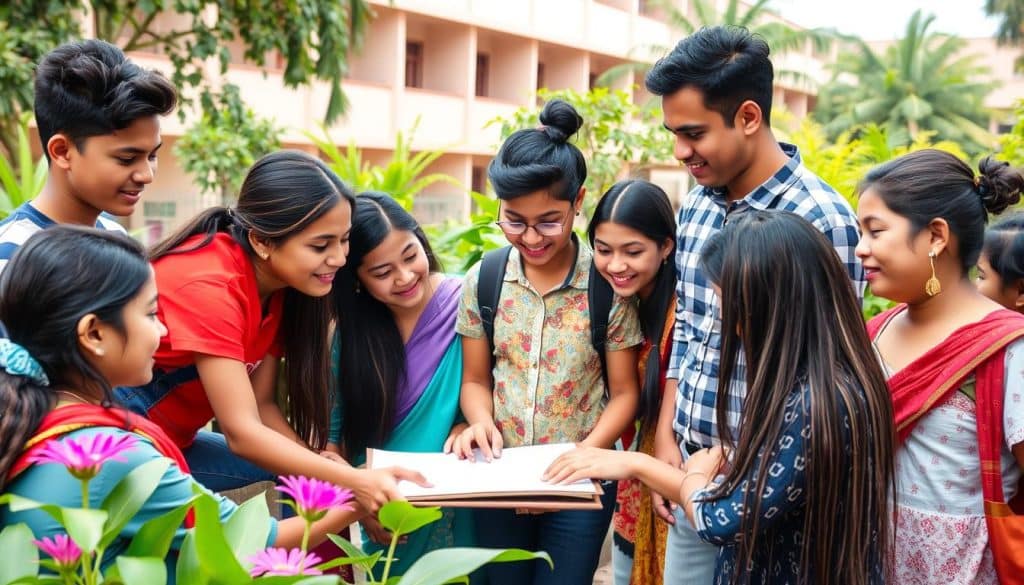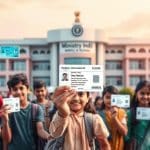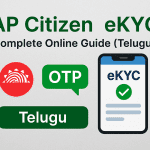![]()
Student Leadership Goals
In India, the demographic bulge of over 600 million individuals under 25 heralds a pivotal moment for leadership development. This vast youth population is a reservoir of potential, awaiting the catalyst of investment in student leadership initiatives. Such programs are instrumental in harnessing the energy and creativity of India’s youth, enabling them to forge the path for their communities and the nation’s future.
Key Takeaways
- Developing leadership skills in students can have a transformative impact on India’s future
- Effective student leadership programs focus on cultivating mindsets, hands-on experience, and civic engagement
- Fostering responsibility, initiative, and problem-solving abilities is crucial for empowering youth leaders
- Partnerships between schools, community organizations, and youth development initiatives can amplify the reach and impact of student leadership programs
- Showcasing student leadership on college applications can provide a competitive edge for future academic and career opportunities
Cultivating Leadership Mindsets from an Early Age
The imperative of developing robust leadership skills among India’s youth cannot be overstated, as it is pivotal in shaping the future leaders of the nation. By instilling these mindsets early on, we unlock the full potential of our students, endowing them with the capabilities to significantly influence their communities.
Identifying Natural Leaders in the Classroom
The classroom serves as an ideal setting for identifying and nurturing innate leadership qualities. Teachers, with their keen observation, can discern students who demonstrate confidence, adept problem-solving abilities, and the capacity to inspire and motivate their peers. These budding leaders should be encouraged to assume greater responsibilities and engage in youth empowerment programs and peer mentorship initiatives.
Nurturing Confidence and Public Speaking Skills
Confidence and proficiency in public speaking are indispensable for effective leadership. By offering students opportunities to hone and display their developing leadership skills, we facilitate their growth in self-assurance and communication. Activities such as student council, debate clubs, and presentations are instrumental in fostering these critical leadership attributes.
By fostering leadership mindsets from an early stage, we empower India’s youth to become the confident, adaptable, and innovative leaders our nation requires. Through strategic programs and a supportive educational environment, we can harness the vast potential of our students, guiding them towards success.
Student Council: A Platform for Hands-On Experience
Student council emerges as a pivotal arena for the development of nascent leaders, offering a rich tapestry of experiential learning. Through active participation in student council endeavors, individuals cultivate critical competencies pivotal for their collegiate aspirations and broader professional trajectories.
The essence of student council resides in its capacity to enable the articulation and pursuit of student council objectives. Members engage in a collective endeavor to pinpoint and rectify school community shortcomings, thereby cultivating a milieu of collaborative problem-solving and teamwork. These attributes are essential in the realm of college application leadership examples.
Furthermore, student council serves as a crucible for the refinement of public speaking and communication prowess. Councilors are afforded the opportunity to enhance their oratory skills through various roles, such as delivering announcements, moderating discussions, and presenting proposals. This experience is invaluable, equipping them with the confidence and articulation necessary for extracurricular activities for leaders.
| Key Student Council Benefits | Practical Applications |
|---|---|
| Collaborative Decision-Making | Identifying school needs and implementing solutions |
| Public Speaking and Presentation Skills | Delivering announcements, leading discussions, and presenting proposals |
| Event Planning and Coordination | Organizing school-wide activities, fundraisers, and community outreach programs |
| Community Engagement | Fostering connections with local organizations and making a positive impact |
Engagement in student council activities equips young leaders with experiential knowledge, enhancing their college applications and empowering them to effectuate positive transformations within their educational and communal environments.

“Student council taught me the value of teamwork, communication, and taking initiative – skills that have been instrumental in my personal and professional development.”
Student Leadership Goals: Fostering Responsibility and Initiative
In our quest to empower India’s youth, the establishment of measurable objectives for student leaders is paramount. This approach enables the development of a sense of responsibility and initiative, thereby equipping young individuals with the necessary tools to exert a significant impact.
Setting Measurable Goals for Student Leaders
Effective student leadership goals must adhere to the SMART criteria: Specific, Measurable, Achievable, Relevant, and Time-bound. This framework ensures that student leaders possess a clear roadmap, replete with quantifiable benchmarks to monitor their advancement. Illustrative examples of SMART goals include:
- Initiating a school-wide recycling program, aiming to increase waste diversion by 20% within the next three months.
- Conducting a series of career workshops, engaging at least 50 students in exploring diverse professional avenues within the next six months.
- Establishing a community outreach initiative, partnering with local organizations to deliver 100 hours of volunteer service within the academic year.
Encouraging Innovation and Problem-Solving
Moreover, effective student leadership goals must promote a culture of innovation and problem-solving. By empowering student leaders to engage in creative thinking and address real-world challenges, we foster their critical thinking abilities and spark their enthusiasm for driving positive change.
| Key Strategies | Benefits |
|---|---|
| Brainstorming sessions | Cultivates out-of-the-box thinking and collaborative problem-solving |
| Design thinking workshops | Teaches a user-centric approach to identifying and addressing issues |
| Mentorship programs | Provides guidance and support from experienced leaders and subject matter experts |
Through the promotion of responsibility and initiative via measurable objectives and innovative problem-solving, we empower the next generation of student leaders to become catalysts of positive change in their communities and beyond.

“The true purpose of education is to cultivate leaders who can transform their communities and the world around them.”
Youth Empowerment Programs: Beyond the Classroom
Transcending the traditional educational setting, youth empowerment initiatives are pivotal in molding the future’s civic-minded populace. These endeavors facilitate a profound connection between students and their immediate environments, empowering them to act as catalysts for transformation.
Partnering with Community Organizations
Engagement with community entities unveils a plethora of opportunities for student leaders. Collaborations with local nonprofits, advocacy organizations, and social service agencies provide students with firsthand exposure to community challenges and necessities. This experiential learning enables them to acquire the competencies necessary for devising and implementing impactful solutions.
Developing Civic Engagement and Social Responsibility
These programs instill a robust sense of civic duty and social accountability within student leaders. Through participation in volunteer activities, community service initiatives, and advocacy endeavors, students refine their ability to articulate their perspectives, advocate for significant reforms, and contribute substantively to the enhancement of their local and global communities. This comprehensive approach equips them with the attributes of engaged, compassionate, and socially aware citizens.















